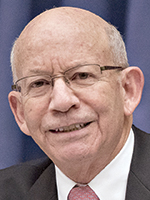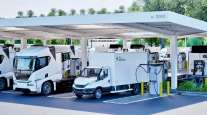Senior Reporter
More Groups Advocating For Highway Bill, Infrastructure Push Congress

[Stay on top of transportation news: Get TTNews in your inbox.]
A coalition of nearly 40 prominent infrastructure stakeholders has urged the powerful Republican leader of the U.S. Senate to set up consideration for a comprehensive highway bill this year.
In their letter to Sen. Mitch McConnell (R-Ky.), the coalition emphasized that an inability to pass a new bill is likely to pave the way for the approval of short-term policy extensions, a scenario they want to avoid.
“History has demonstrated that delaying action on such measures until their deadline leads to two outcomes: short-term extensions; and disruption of state highway improvement plans,” the groups wrote to McConnell on Oct. 17.
Fortunately, infrastructure is such a naturally nonpartisan issue; not bipartisan, right. It’s nonpartisan. It’s technology.
Adie Tomer, of the Metropolitan Policy Program at the Brookings Institution
The coalition included the American Road and Transportation Builders Association, the American Society of Civil Engineers, and the U.S. Chamber of Commerce. They applauded the five-year measure the Senate Environment and Public Works Committee advanced over the summer to update the nation’s current highway policy, called the Fixing America’s Surface Transportation Act. That law expires in the fall of 2020.
The Senate highway bill would “deliver meaningful enhancement to the nation’s highway and bridge infrastructure network,” the coalition argued. “It would provide historic investment levels, deliver beneficial projects faster by cutting red tape, tap private sector capital and innovations, prioritize safety, and improve the quality of life for rural and urban communities.”
The Senate bill, however, awaits input from committees with jurisdiction over freight policy, transit systems and the Highway Trust Fund.
A number of the Oct. 17 letter’s signatories have publicly endorsed raising the 24.4 cents-per-gallon federal diesel tax and 18.4 cents-per-gallon gas tax as a way of addressing the trust fund’s looming insolvency. The account assists highway programs nationwide by relying on insufficient revenue from federal fuel taxes.

A truck drives over a bridge in need of repair in Detroit. (Paul Sancya/Associated Press)
Freight stakeholders, trade unions, roadbuilders, transit operators, state highway officials and business interests have consistently joined hands over the years to pressure House and Senate leaders to approve a timely update of federal surface transportation programs. With interest in climate change, urban mobility and alternative modes of travel evolving, nonfreight advocates have seemed more vocal about infrastructure.
These groups include environmentalists, bicyclists, preservationists and the real estate sector.
For instance, at the American Public Transportation Association annual conference in New York City this month, the National Association of Realtors unveiled a report highlighting the benefits of transit-centric communities.
“The results of our report, conducted over multiple years alongside the American Public Transportation Association, should reiterate to policymakers at all levels of government the importance of investing in modern, efficient infrastructure that facilitates growth and helps our nation keep pace in a rapidly evolving world,” NAR’s first vice president, Charlie Oppler, said on Oct. 14
A legislative priority for the Realtors in 2019 is investing in projects nationwide. As the group indicated, “Funds should be sufficient to maintain the current physical condition and level of performance of highways and transit systems while making improvements to reduce congestion and foster economic growth. Infrastructure investment should consider all transportation users and should be all-inclusive so that critical systems, such as water or ports, are also prioritized while maintaining a community’s infrastructure.”
After the Environment and Public Works Committee unveiled its five-year highway policy proposal, the League of American Bicyclists’ Caron Whitaker called it “great for biking and walking.”
“The new bill makes key improvements to funding programs while also including a new set of climate-related programs and bicycle-friendly policy. Not only did we get much of what the League asked for on safety and infrastructure, bicyclists will benefit from new programs regarding emission and congestion reductions,” she noted in July.
The highway bill, as it’s known inside the Beltway, has appealed to an eclectic transportation lobby over the past three decades due to its potential for boosting budget accounts, as well as modernizing a grid built during the Eisenhower administration. Adie Tomer, of the Metropolitan Policy Program at the Brookings Institution, acknowledged the potential before Congress for adopting new technologies.
“Fortunately, infrastructure is such a naturally nonpartisan issue; not bipartisan, right. It’s nonpartisan. It’s technology,” Tomer recently told Transport Topics. “We got this really unique opportunity where we’re not in kind of a business-as-usual moment.”

DeFazio
It is unclear when the Senate will proceed with its consideration of highway legislation. Neither McConnell nor the chairmen of the freight, transit and tax-writing committees have outlined a roadmap for the EPW-passed measure.
On the House side, Transportation and Infrastructure Committee Chairman Peter DeFazio (D-Ore.) said his timeline is next year for proceeding with modernization efforts of the Eisenhower-era Interstate Highway System. House Democrats also are proceeding with a time-consuming impeachment inquiry of President Donald Trump, which threatens to derail the legislative agenda.
Meanwhile, most transportation policymakers continue to avoid tackling the federal fuel tax, which props up a significant portion of highway programs and hasn’t increased since 1993. Several members of Congress advocate for vehicle-miles-traveled programs, infrastructure banks and public-private agreements.
Want more news? Listen to today's daily briefing:





